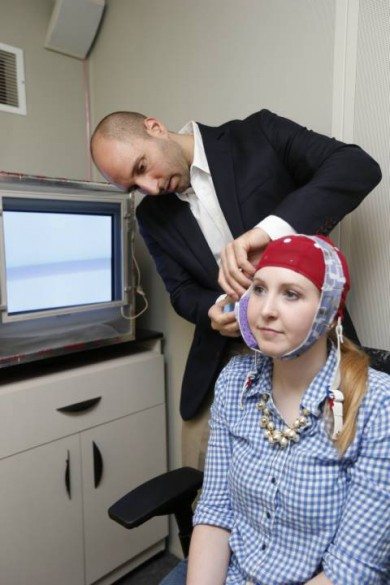Researchers Develop Thinking Cap
In the not too distant future, you may be able to put on a real thinking cap to improve your ability to learn. A research team at Tennessee’s Vanderbuilt University recently conducted a study that may help people wanting to increase their learning ability and may also help to treat medical conditions such as Attention Deficit Hyperactivity Disorder (ADHD) and schizophrenia.
The “thinking cap” is comprised of an elastic cap and two electrodes. Each electrode is attached to a saline-soaked sponge, these are attached to the cheek and the crown of the head. Researchers used the cap to apply 20 minutes mild electrical stimulation through the skulls of their subjects. The subjects were then put through a number of tests. After the stimulation they learned quicker and made fewer mistakes.
Infrared Vision Contact Lenses
Electrical engineer Zhaohui Zhong, and his team of researchers at University of Michigan, have developed a means of using nanomaterial graphene to capture the infrared spectrum. This means that they may in the future, be able to develop infrared vision contact lenses to replace infrared goggles.
Graphene has the edge on cumbersome goggles because it is comprised of a carbon lattice that is just a single atom thick which makes it the perfect size to fit on a contact lens. Researchers still have a way to go however, because although graphene detectors can sense the infrared spectrum at room temperature, they sensitivity is very poor. It needs to be a hundred to a thousand times stronger to make it suitable for commercial devices.
Cyborg Olympics for Robot-assisted Athletes
Just a few months after the 2016 Summer Olympics in Rio de Janeiro, a new kind of Olympic competition will be taking place in Zurich; the Cybathlon—the first athletic games for competitors who are robot-assisted parathletes.
Events will include an race course for athletes who have lost the use of their legs, who will compete wearing exoskeleton suits. An arms prosthetic race in which amputees will where cybernetic arms and compete in hand-arm courses.
The event is hosted by the Swiss National Competence Center of Research, with the aim of raising interest and awareness in human performance enhancing technology.



















